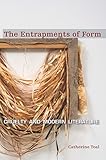The Entrapments of Form : Cruelty and Modern Literature / Catherine Toal.
Material type: TextPublisher: New York, NY : Fordham University Press, [2016]Copyright date: ©2017Description: 1 online resource (184 p.)Content type:
TextPublisher: New York, NY : Fordham University Press, [2016]Copyright date: ©2017Description: 1 online resource (184 p.)Content type: - 9780823269358
- 9780823269372
- American literature -- History and criticism -- 19th century
- American literature -- 19th century -- History and criticism
- Cruelty in literature
- French literature -- History and criticism -- 19th century
- French literature -- 19th century -- History and criticism
- LITERARY CRITICISM / General
- Modernism (Literature) -- France
- Modernism (Literature) -- United States
- Modernism (Literature) -- France
- Modernism (Literature) -- United States
- LITERARY CRITICISM / Modern / 19th Century
- American Literature
- Contemporary Philosophy
- Critical Theory
- Cruelty
- French Literature
- Psychoanalysis
- 840.9353
- PQ295.C7T63 2016
- online - DeGruyter
- Issued also in print.
| Item type | Current library | Call number | URL | Status | Notes | Barcode | |
|---|---|---|---|---|---|---|---|
 eBook
eBook
|
Biblioteca "Angelicum" Pont. Univ. S.Tommaso d'Aquino Nuvola online | online - DeGruyter (Browse shelf(Opens below)) | Online access | Not for loan (Accesso limitato) | Accesso per gli utenti autorizzati / Access for authorized users | (dgr)9780823269372 |
Frontmatter -- Contents -- Introduction: The "Strange and Familiar Word" -- Chapter One. The Forms of the Perverse -- Chapter Two. "Some Things Which Could Never Have Happened" -- Chapter Three. Murder and "Point of View" -- Chapter Four. The Marquis de Sade in the Twentieth Century -- Chapter Five. American Cruelty -- Acknowledgments -- Notes -- Index
restricted access online access with authorization star
http://purl.org/coar/access_right/c_16ec
Arguing that cruelty acquires a new meaning in modernity, The Entrapments of Form follows its evolution through exchanges between French and American literature over the contradictions of Enlightenment (slavery, genocide, libertine aristocratic privilege). Catherine Toal traces Edgar Allan Poe's influence on the Sadean legacy, Melville's fictional dramatization of Tocqueville, and Henry James's response to the aesthetic of his French contemporaries, including Flaubert. The result is not simply a work that provides close readings of key literary texts of the nineteenth century-Benito Cereno, The Turn of the Screw, Les Chants de Maldoror-but one that shows how in this era cruelty develops a specific narrative structure, one that is confirmed by the manner of its negation in twentieth-century philosophy. The final chapters address this shift: the postwar French reception of Sade and the relationship between American cultural theory and the rhetoric of the so-called war on terror.
Issued also in print.
Mode of access: Internet via World Wide Web.
In English.
Description based on online resource; title from PDF title page (publisher's Web site, viewed 02. Mrz 2022)


